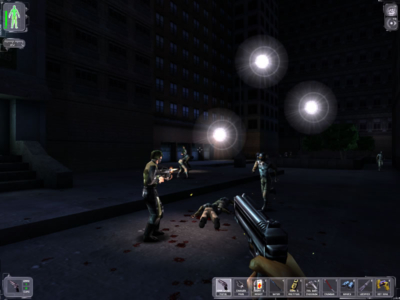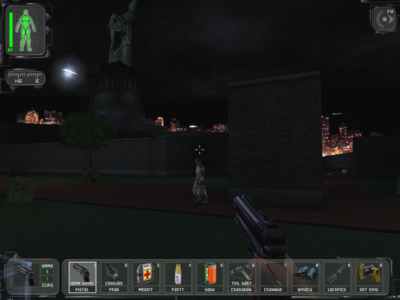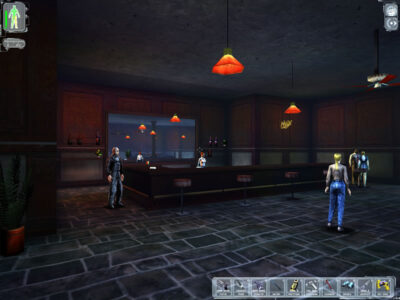
Deus Ex
Written by: Stoo
Date posted: April 9, 2003
- Genre: RPG
- Developed by: Ion Storm
- Published by: Eidos
- Year released: 2000
- Our score: 10
The name Ion Storm will probably be forever tainted by the colossal flop known as Daikatana, but let’s not forget the work done by the other Ion Storm. That is, their studio in Austin, who in 2000 brought us Deus Ex. At the head of the project was Warren Spector, who had done great things with Looking Glass as producer on System Shock, and gamers were hoping for something great in the spirit of the quality first-person gaming we had come to know from LG. The result was a fusion of gaming genres, much acclaimed by reviewers and gamers, and a review of it for this site is long overdue.
A quick overview of what kind of game this is: you view the world, move around and use weapons in the traditional shooter style. However, what you can do and how effective you will be at it, is determined with an RPG-style skills system. You can also converse with characters you meet, interact with features of the environment and manage your gear with an inventory system, all more detailed features you would more commonly expect of an RPG.
Deus Ex is set in a dystopian near future, a bleak vision of how our world could turn out in twenty or so years. The gap between rich and poor has continued to rise, and the economy is in chaos. Violence and crime an everpresent threat to those outside the wealthy few. Freedoms are at risk from authoritarian governments, the USA has seen another civil war and terrorist groups pose a constant threat. To make matters worse, a plague is currently threatening to cause widespread death, especially amongst the poor who cannot afford the cure.
Our hero within this world is JC Denton, new agent for a special United Nations anti-terror agency. He does look a bit like an extra from the Matrix, with his trenchcoat and sunglasses which he resolutely wears in the brightest of lighting, but please don’t hold that against him. He does also boast one of the best gravely, deadpan voices in gaming. JC isn’t just a special agent, he’s something of a walking experiment with his body having been infused with nanomachines. These have the potential to make him faster, stronger and more durable, and even grant more exotic abilities. Many powerful individuals are quite keen to see how JC performs.
Following the obligatory tutorial sessions, the game proper begins with you taking control of JC in his first mission. It seems terrorists have occupied the Statue of Liberty, and the powers that be see this as an ideal field test for this new generation of agent. Your purpose seems pretty clear at this point; take orders from the UN bosses and sort out dastardly terrorists. However, as events unfold the situation starts to look more murky. You hear allegations that supplies of plague cure are being restricted. Then learn that JC’s brother Paul, the only other nanotech-powered operative, is taking an oddly cautious stance on tackling the terrorists. Then you catch the sinister head of a government agency torturing prisoners back at headquarters. As it turns out, you’ll have good reason to question your loyalties.
Play this for a while, and you’ll see that the narrative brings in several elements popular in conpiracy theory lore. Secret technologies, black helicopters in the skies, and ominous suited “Men in Black” to name a few. At the heart of it, powerful organisations bent on achieving world domination through manipulated governments, careful control of information and communications and a repressed, ignorant population. A lot of this is pretty cliched, for sure. Still though, it makes for great thriller material. It’s true my standards for quality storytelling are probably lower for gaming than other forms of media, but this game at least does its bit to push that standard upwards.
You’ll find yourself meeting a varied cast of characters along the way. Some are just pawns, others valued allies, but the most interesting are the powerful figures manipulating events from behind the scenes. Look out for shady figures that are above the law, technologists and even artificial intelligences, all planning on shaping the world to their own visions. A couple of the big players are obvious villains, but with others it’s more of a grey area. With no clear-cut answer as to who has the right idea, and conflicting philosophies being offered that each have some good points to them, it’s up to you to decide who you’d rather believe.
Throughout the course of the game, the narrative pushes you to find out exactly what’s going on, and what you can do about it. There are no pauses for cutscenes; the story is told in-game through events and interactions with the characters you meet. Not only does it draw you in and immerse you in its shady world, the game also might even provoke a few questions. Do people really want freedom? How much can we handle, and would we rather have some all-knowing force watch over us? Is security more important? Can we be trusted with ourselves? Will you find the truth, or will you be forced to picka truth from the options presented? Thus Deus Ex is one of the few games that actually makes you think a bit, about the social and political issues raised.
In fact I only have one real problem with the story and how it’s presented: the opening sequence gives too much away. Skip it, and you’re left only knowing as much as JC does himself, which is a much more enjoyable perspective. Also here’s a cryptic hint: look for a talkative computer in France. Meeting it is entirely optional, but it has some Big Questions for you to ponder.
Much of the first half of the game is set in New York City. It might be a bit brown at times, but can also be quite grimy and gritty; an example of the world in which those not part of the wealthy elite must live. Thugs roam the streets, parks are full of bums and drunks, and ordinary people do their best to live amidst the crime, processed junk food and untrustworthy media. Later on you’ll find yourself in Hong Kong, which is perhaps the most entertaining section. Here you can take a break from the action to wonder in the marketplace, visit a club, chat with vendors and visit the local temple. Later on the trend is towards generic-looking underground military bases, which are a little harder to make interesting, but overall Deus Ex is great for convincing and immersive environments. It’s all about that illusion of this being a ‘real’ world into which you’re stepping, as opposed to a set of gaming maps. Which is as much about good level design as it is hi-tech graphics engines. Apart from the slayout of the maps, you can always count on some good attention to detail within. Many characters have somthing to say, even if not important to your mission. Junk items like basketballs can be picked up and tossed around, just for the hell of it. You can pick up food for a few health points. or drink booze which results in a dizzying distortion of your vision.
The overall structure of the game is pretty much linear, and you’ll always visit these locations in the same order, with little control over the narrative. Apart from one or two key events, you only get any real choice in what happens right at the end. However, exactly how you get from A to B is often left up to you. In this way, the game does a reasonable job of hiding the rails on which the narrative runs. The level maps allow plenty of freedom of movement, and there’s often more than one way into a location. One section for example sees you breaking into a terrorist hideout in a warehouse, and you’re given the choice of approaching it via the rooftops or crawling through the sewers.
On a more general note, you have a wide degree of freedom to play as a gun-toting action hero, or a more sneaky and stealthy type. When trying to enter an enemy-held building, are you the sort to kick down the front door and gun everyone down? Or would you rather come in through a window and stab them in the back? Say you’re facing a huge robot, bawling at you whilst letting rip with machineguns. You could shoot it with a rocket launcher, or try and find a controlling computer and shut it down from there. Or just creep past and hope the big metal bastard never sees you.
The stealth side isn’t quite as fully developed as Thief, but does offer a viable option for those with patience. The level of illumination in your current location will affect your visibility (although some kind of indicator would have been helpful), and it helps to make as little noise as possible. Enemies meanwhile can go between alert, cautious and hostile. Unfortunately, if you shoot at someone then they, along with everyone else on the map, will know your exact location and come running at you. Which is pretty unrealistic. On the plus side for stealth fans, though, there are a range of silent weapons for taking down baddies with minimum fuss.
Some of those are also nonlethal, like tranquiliser darts. It might seem an odd issue to be concerned about when we’re just talking about a videogame, but when you’re really getting in to it, you might start questioning whether the guys shooting at you truly deserve to die. After all, they might just be regular decent guys misled by corrupt leaders. Plus, something feels just a little bit more professional about leaving a few guards unconscious, rather than twenty of them dead in pools of blood – anyone who’s played Thief will know what I mean.
Then again you might just enjoy shooting people in the head. You bloodthirsty psycho. So there’s a decent section of guns available, from pistols and shotguns to larger. The assault rifle feels a little disappointing, more like a staplegun really, but a good square blast from a shotgun is always satisfying. Meanwhile the humble pistol is useful throughout the game if you use it carefully and aim for headshots, and it doesn’t take up much space in the inventory. As for heavy guns, I actually avoid the rocket launcher as it makes dealing with big armoured targets too easy. There are also melee weapons, from a riot baton up to a big glowing energy sword. Let’s face it, everyone loves big glowing swords.
In determining what kind of agent you want to mould JC into, this is where the RPG side to the game comes in. Fear not if visions of orcs, +2 Maces of Bashing and beards come to mind, as it’s all pretty slick and streamlined, and directly relevant to the kinds of actions JC might take. There are a range of skills on offer, which will be at the level of untrained, trained, skilled or a master. As the game progresses you are awarded points for achieving objectives, with more if you mange to find and complete various secondary goals. These can be spent at any point to upgrade JC’s abilities.
Obviously enough some skills are related to the aforementioned weaponry, controlling accuracy and damage done. For example you can use a sniper rifle with no skill, but your sights through the scope will wander all over the place. Spend enough points, though, and your aim becomes rock steady. So you can score headshots from the other side of the map. Increased skill with heavy weapons meanwhile will let you move faster whilst wielding them.
Other skills concern interactions with the world around you, useful to those going for the more subtle approach. One is lockpicking – the higher the skill, the less disposable picks you’ll need to use on a door (assuming you don’t just blow it off its hinges). Similarly hacking lets you disable traps and security cameras from the safety of a computer terminal, and turn automated security turrets against your enemies. However you can’t be good at all the skills; most likely you’ll only reach master in one or two. It always helps replayability, when you can try the game again with a character specialised in different areas.
Along with that is the range of nanotech augmentations which you can apply to JC. These include boosts to strength and speed, for when you want to make a hasty escape or throw huge metal crates around. There’s also invisibility for stealth fans, and protection against various weapon types. You can even see enemies through walls. It does lend to a feeling of JC becoming just a little bit of a superhero, without getting too ridiculous or over the top. Which is quite appropriate; he is supposed to be a whole new kind of technology-enhanced human after all.
That’s the game’s functionality covered. Overall it does a pretty great job of blending together elements from two traditional gaming genres. It has to be said the formula owes a lot to System Shock 2. However there’s no shame in mimicking a good idea and besides, it’s a very different creature in terms of narrative and themes. While of course I still enjoy the more straightforward actoim of Half-Life, I’ve always preferred first-person titles with something more to their gameplay. The Deus Ex, System Shock and Thief families can be considered spirtual brothers of a sort (even if Thief doesn’t have the RPG aspects); first person titles with greater depth and freedom of movement and action.
Of course, I can see room for improvement in future games of this type. A less linear structure would be worth considering – although i appreciate this can make a strong narrative more difficult – along with the ability to actually make decisions that affect major events. Better AI would help also. How about larger, open city areas to move around in freely, looking for information to unravel conspiracies whilst avoiding the forces of sinister agencies. Sadly the sequel, Invisible War failed to deliver any of that, and was in fact a minor disappointment.
We shouldn’t let that tarnish this one, though. Deus Ex is one of those games we have no hesitation in calling a classic. Even Rik has tried it, and he normally locks RPGs away in a deep dark drawer where they can never trouble him again. I do try not to declare “everyone should play this” for even the greatest games, because I know some gamers just plain aren’t interested in anything like this. However, if any title can be called an essential classic of PC gaming, this one can.





 Posts
Posts